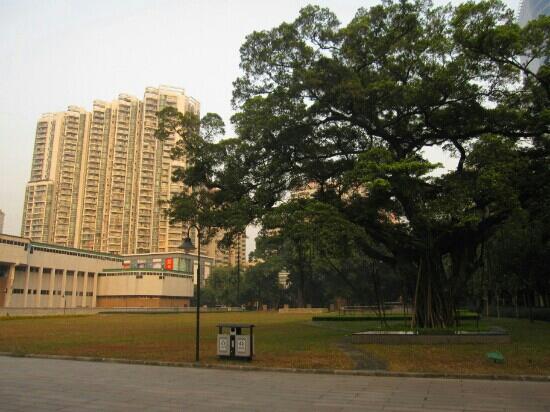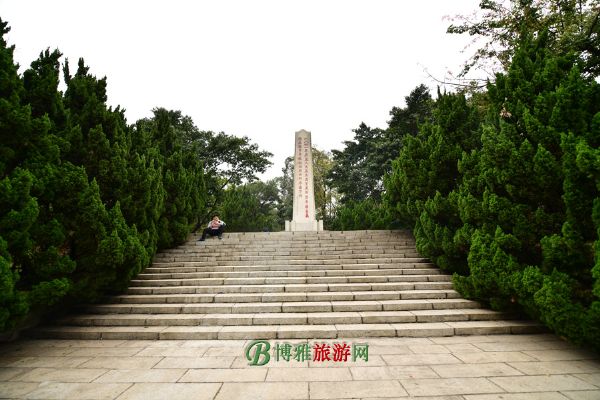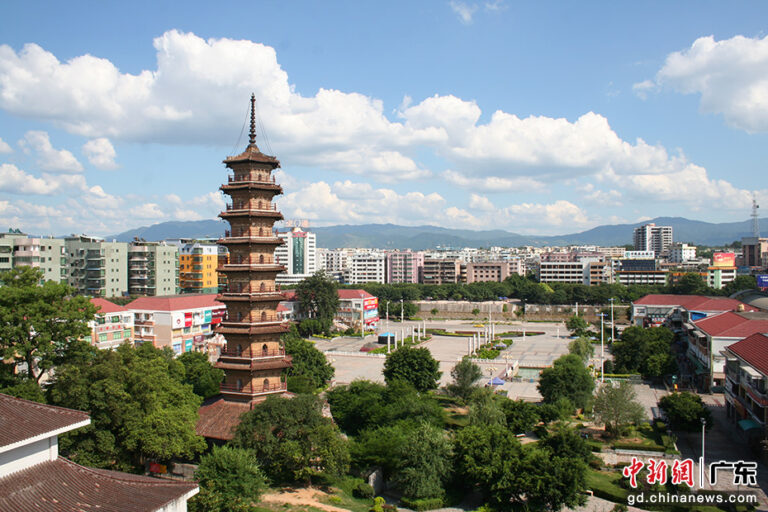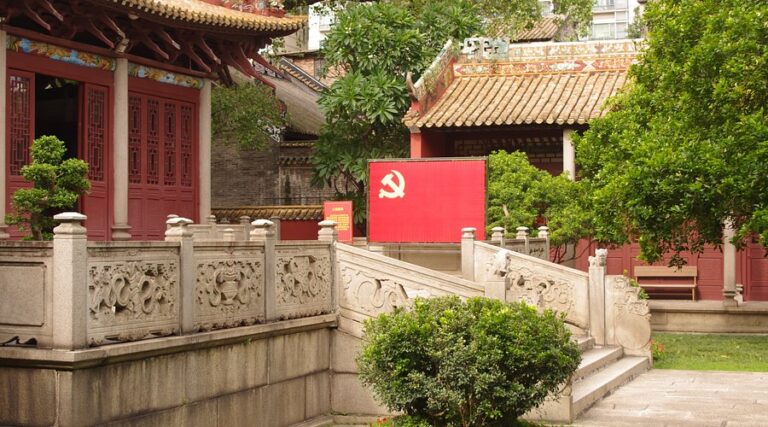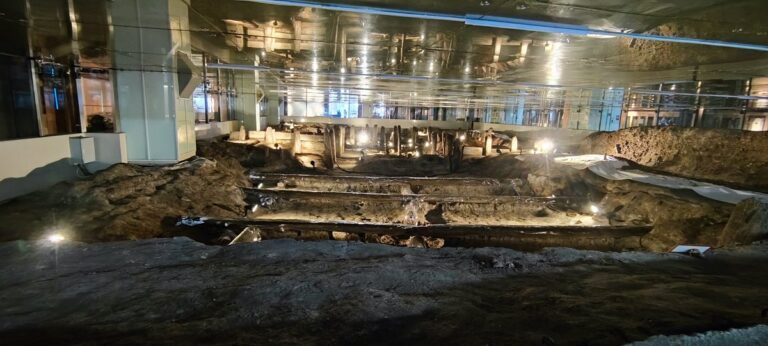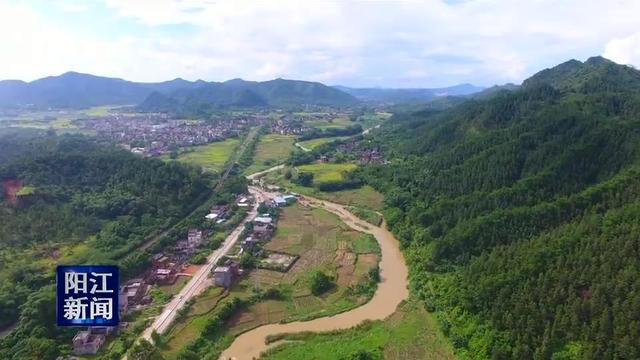Unveiling the Flavors of Dongguan: A Journey Through Jiangguangnai Guju
An Essential Guide to Visiting Dongguan Jiangguangnai Guju
In This Guide
- An Essential Guide to Visiting Dongguan Jiangguangnai Guju
- The Rich History of Dongguan Jiangguangnai Guju
- Main Highlights: What to See at Dongguan Jiangguangnai Guju
- Planning Your Visit: A Practical Guide
- Tickets, Hours, and Booking
- How to Get There
- Local Cuisine and Accommodation
- Frequently Asked Questions
- Final Thoughts on Your Trip
Nestled in the vibrant city of Dongguan, the Jiang Guangnai Former Residence, also known as Liyin Garden, stands as a testament to the region’s rich heritage and historical significance. This exquisite villa, built during the Qing Dynasty, offers visitors a glimpse into the life of General Jiang Guangnai, a revered figure in China’s resistance against Japanese invasion. The residence was established by his grandfather, Jiang Lixiang, who cleverly designed the estate to flourish with lush lychee trees, providing a refreshing canopy of shade.
As you step into Liyin Garden, you are greeted by a harmonious blend of Western architectural elegance and traditional Chinese features. The intricate design, which includes beautifully carved windows and stately columns, reflects the cultural exchanges that defined the era. Surrounded by fragrant fruit trees, the garden serves not only as a picturesque landscape but also as a peaceful retreat where history whispers through the leaves.
Visitors to Jiang Guangnai’s home will find themselves immersed in a world where past and present coexist. Each artifact and display within the residence speaks volumes about the general’s impactful life and the turbulent times he navigated. Beyond its historical allure, the site also functions as an educational hub, inviting guests to engage with China’s patriotic legacy.
For those exploring Dongguan, a visit to Jiang Guangnai Former Residence is more than just a tour; it is a journey through time, where the echoes of heroic deeds and cultural richness await discovery. Whether you’re a history enthusiast, an architecture aficionado, or simply looking to enjoy a serene environment, Liyin Garden promises an enriching experience that resonates long after you leave.
The Rich History of Dongguan Jiangguangnai Guju
Nestled in the scenic surroundings of Dongguan, the Jiang Guangnai Former Residence, also known as Liyin Garden, offers a glimpse into the life of one of China’s notable historical figures. This elegant villa was constructed in the Daoguang era of the Qing Dynasty, under the guidance of Jiang Guangnai’s grandfather, Jiang Lixiang. The garden, renowned for its abundant lychee trees, was established during a time when the region was flourishing with cultural and agricultural growth.
Jiang Guangnai, born in 1888, spent his formative years in this residence, where he was shaped by the ideals and struggles of his time. He emerged as a prominent military leader during the Second Sino-Japanese War, gaining recognition for his leadership and strategic prowess. His residence thus serves not only as a family home but also as a birthplace of resilience and national pride.
The architectural design of the residence is a remarkable blend of Western and traditional Lingnan styles, reflecting the cultural exchanges of the era. The structure’s graceful lines and intricate stone carvings stand as a testament to the artistic spirit of the time, symbolizing the family’s open-mindedness and adaptability. The entrance features a plaque inscribed with “Liyin Garden,” complemented by a couplet that evokes a sense of aspiration and reflection on the nature of existence.
Throughout its history, the residence has witnessed significant events and changes. It was here that Jiang Guangnai developed his revolutionary spirit, ultimately becoming a key figure in the military campaigns against Japanese aggression. His leadership during the “January 28 Incident” in Shanghai was particularly notable, as he played a crucial role in rallying forces against the invading troops.
Following Jiang Guangnai’s death in 1967, the residence fell into disrepair until it was designated a key cultural heritage site by local authorities in 1987. Restoration efforts were initiated to preserve its historical significance and to provide a space for education and reflection. Today, the Jiang Guangnai Former Residence stands as a patriotic education base, offering visitors a comprehensive look into the life of a national hero and the broader historical context of the time.
Visitors to the site can explore the beautifully landscaped gardens, filled with fruit trees and shaded by lush foliage, providing a serene environment that echoes the past. Inside the residence, displays of personal artifacts, letters, and wartime memorabilia vividly illustrate Jiang Guangnai’s legacy and the turbulent history of early 20th-century China.
In summary, the Jiang Guangnai Former Residence is more than just a historical building; it is a living testament to the enduring spirit of a family and a nation, bridging the past and present while inviting visitors to reflect on the sacrifices and triumphs that have shaped modern China.
Main Highlights: What to See at Dongguan Jiangguangnai Guju
Nestled in the heart of Dongguan, the Jiang Guangnai Former Residence, also known as Liyin Garden, offers a fascinating glimpse into both history and architecture. This elegant villa, established during the Qing Dynasty, serves as the ancestral home of General Jiang Guangnai, a prominent figure in China’s resistance against Japanese aggression.
As you approach the residence, the lush greenery surrounding the property immediately captures your attention. The garden is replete with lychee and longan trees, providing a serene canopy that offers respite from the sun. The entrance features a beautifully inscribed plaque, while a pair of couplets flanks the doorway, inviting visitors to ponder the aspirations of its historical residents.
The architectural style of Liyin Garden is a striking blend of Western and traditional Lingnan elements. The structure boasts ornate carvings and elegant columns that echo the sophistication of its time, making it a significant representation of cultural fusion. This unique design not only reflects the family’s open-mindedness but also the broader cultural interactions occurring during the era.
Inside, each room is a treasure trove of artifacts that tell the story of General Jiang and his family’s historical significance. Personal belongings, letters, and wartime memorabilia paint a vivid picture of their lives and contributions to Chinese history. As a designated site for patriotic education, the residence serves as an important cultural landmark, connecting visitors to the rich narrative of China’s past.
For those planning a visit, the residence is open from Tuesday to Sunday, welcoming guests from 9:00 AM to 5:00 PM. Admission is affordably priced, with discounts available for students and seniors. To enhance your experience, guided tours are offered, providing deeper insight into the life of General Jiang and the historical context of the residence.
In addition to the former residence, the surrounding area boasts other attractions, such as the Opium War Museum and Humen Park, making it easy to fill your day with enriching cultural experiences. Whether you’re a history enthusiast or simply looking to enjoy a unique architectural gem, Jiang Guangnai Former Residence is a must-visit destination that promises to leave a lasting impression.
Planning Your Visit: A Practical Guide
Visiting Dongguan’s Jiangguangnai Guju (蒋光鼐故居) offers a unique glimpse into the architectural and historical heritage of the region. Here’s everything you need to know to make the most of your visit to this significant cultural site.
Location and Access
Jiangguangnai Guju, also known as Liyin Garden (荔荫园), is situated in the scenic Nanzha Village of Humen Town, Dongguan City, Guangdong Province. The exact address is No. 1, Sanjiang Xinjilane, Humen Town, Dongguan. It’s easily accessible by public transportation. Visitors can take local buses or taxis from various parts of Dongguan to reach the site.
Hours of Operation
The site is open to the public Tuesday through Sunday, from 9:00 AM to 5:00 PM. It is advisable to plan your visit during weekdays to avoid crowds.
Admission Fees
Admission to Jiangguangnai Guju is quite affordable, with ticket prices set at 20 CNY per person. Discounts are available for students and seniors, who can enter for half the price.
Exploring the Site
As you enter Liyin Garden, you’ll be greeted by a beautifully landscaped area that spans 1,551 square meters. The garden is adorned with a variety of fruit trees, including lychee and longan, providing a refreshing shade that enhances the tranquil atmosphere.
-
Architectural Highlights: The residence is a blend of Western villa styles and traditional Lingnan architecture, showcasing exquisite craftsmanship in its details. The entrance features a plaque inscribed with “Liyin Garden” and a poetic couplet that reflects the aspirations of the family.
-
Cultural Significance: The home is not just an architectural gem; it is also a monument to General Jiang Guangnai, who was born here. His legacy as a prominent figure in the anti-Japanese resistance during the Second Sino-Japanese War is preserved through various artifacts and exhibits within the house.
Nearby Attractions
After touring the residence, consider exploring the following nearby sites:
- Humen Park: A large urban park about 3.8 kilometers away, perfect for a leisurely stroll or a picnic.
- Opium War Museum: Located around 5.2 kilometers from the residence, this museum offers insights into the historical context of the Opium Wars and their impact on China.
- Shajiao Fort: A historical military site located approximately 3.9 kilometers away, where visitors can learn about its role during the Opium Wars.
Tips for Visitors
- Guided Tours: Consider joining a guided tour to enhance your experience. Knowledgeable guides provide deeper insights into the history and significance of the site.
- Respect the Environment: As a historical site, it’s important to maintain a respectful demeanor. Avoid touching artifacts and keep noise levels down to preserve the experience for everyone.
- Safety Precautions: Some areas can be narrow, so be mindful of your surroundings.
Contact Information
For more information or specific inquiries regarding your visit, you can reach the Jiangguangnai Guju management team at +86-769-85561504.
By following this practical guide, you can fully immerse yourself in the cultural and historical richness of Jiangguangnai Guju, making your visit both enjoyable and enlightening. Enjoy your journey through time in Dongguan!
Tickets, Hours, and Booking
Visiting the Dongguan Jiangguangnai Guju (蒋光鼐故居) is an enriching experience that allows you to step back in time and explore the life of this historical figure. Here’s everything you need to know about tickets and visiting hours.
Ticket Information
- Admission Fee: The ticket price is 20 CNY (approximately 3 USD), making it an affordable cultural experience.
- Discounts: Students and seniors can enjoy a 50% discount, bringing their ticket price down to 10 CNY.
- Free Entry Days: Keep an eye out for special occasions or events when admission might be waived.
Opening Hours
- Daily Operations: The site is open from 9:00 AM to 5:00 PM, Tuesday through Sunday. It is closed on Mondays, so plan your visit accordingly.
- Recommended Visit Duration: Allocate about 1 to 2 hours for your visit to fully appreciate the historical significance and explore the gardens and exhibits.
Booking Tickets
Tickets can be purchased on-site, but it is advisable to arrive early, especially during weekends and holidays when visitor numbers can rise. For those looking to secure their entry in advance, consider booking through local travel apps or websites that might offer additional discounts or packages.
Visitor Tips
- Guided Tours: Consider joining a guided tour for a more immersive experience. Knowledgeable guides will provide insights into the life of Jiang Guangnai and the historical context of the residence.
- Respectful Conduct: Visitors are encouraged to maintain a respectful demeanor while exploring the site, as it is not just a tourist attraction but also a site of cultural heritage.
This historical residence, nestled within a serene garden filled with lush fruit trees, offers a tranquil escape from the hustle and bustle of modern life while providing a glimpse into China’s past. Enjoy your visit!
How to Get There
Getting to Dongguan Jiangguangnai Guju (蒋光鼐故居) is quite convenient, thanks to its central location in the bustling city of Dongguan, Guangdong Province. This historical site, also known as Liyin Garden, is situated in the Humen Town area, making it accessible via various modes of transportation.
By Public Transport
Bus Services
Dongguan has an extensive bus network, and several routes connect the city center to Humen Town. Look for buses heading to the Humen area, and disembark at stops near the Jiangguangnai Guju. Typically, the journey from Dongguan’s main bus station to the site will take around 30 to 40 minutes, depending on traffic.
Metro Services
Although Dongguan does not yet have an extensive metro system, the nearby city of Guangzhou does. From Guangzhou, you can take the Metro Line 2 to the Guangzhou South Railway Station, then transfer to a high-speed train heading to Dongguan. Upon reaching Dongguan, continue your journey via local buses or taxis to the residence.
By Taxi or Ride-Hailing Services
For those seeking a more direct route, taxis and ride-hailing services like Didi are readily available throughout Dongguan. Simply input the destination, Jiangguangnai Guju, or its address (南柵新基村, 虎門鎮, 東莞市) into the app to receive a fare estimate. The trip from Dongguan’s city center should take approximately 30 minutes, depending on traffic conditions.
By Car
If you prefer to drive, renting a car is a viable option. The roads leading to Jiangguangnai Guju are well-maintained, and parking is usually available nearby. From Dongguan city center, take the G105 National Road towards Humen, following signs to the site. Make sure to have GPS or a reliable map app handy for the best route.
Nearby Transportation Hubs
Dongguan Railway Station
For those traveling from other cities in China, Dongguan Railway Station is a convenient arrival point. From the station, you can take a taxi or bus to Jiangguangnai Guju, which is approximately a 20-minute drive away.
Guangzhou Baiyun International Airport
If you’re flying in, the nearest major airport is Guangzhou Baiyun International Airport. From the airport, you can take a high-speed train to Dongguan, followed by a short taxi ride to the residence.
Accessibility
The site is generally accessible for visitors, with paths leading to the entrance well-maintained. However, due to the historical nature of the building and its surroundings, some areas may present challenges for those with limited mobility.
Conclusion
Visiting Dongguan Jiangguangnai Guju is a straightforward process, whether you choose to explore via public transport, taxi, or your own vehicle. Plan your trip accordingly, and enjoy this magnificent slice of history nestled in the heart of Dongguan!
Local Cuisine and Accommodation
When visiting the historic Jiang Guangnai Former Residence in Dongguan, you’ll find plenty of options to satisfy your culinary cravings and comfortable places to stay, ensuring a well-rounded trip.
Dining Options
1. Li Xiang Lou (荔香楼)
Located about 27 kilometers away, Li Xiang Lou offers an authentic taste of Cantonese cuisine. Known for its fresh ingredients and traditional cooking methods, this restaurant is an excellent choice for those looking to indulge in local flavors. Be sure to try their signature dishes featuring seafood and seasonal vegetables, which highlight the region’s rich gastronomic heritage.
2. Da Guan Jia (大莞家)
This fast food establishment, also approximately 27 kilometers from the residence, is perfect for a quick and satisfying meal. Known for its affordable prices and variety, Da Guan Jia caters to both locals and tourists alike. Their menu includes a selection of classic Chinese fast food items that are sure to please everyone in your group.
3. He Liu Shan (鶴留山)
If you’re craving a more casual dining experience, He Liu Shan is another great option. Located nearby, this eatery serves quick meals that include rice dishes and noodle soups. It’s an ideal spot for a relaxed meal before or after your visit to the former residence.
4. Li Feng Restaurant (丽丰老店)
Just 239 meters from Jiang Guangnai Former Residence, Li Feng Restaurant specializes in traditional Cantonese dishes. Its proximity makes it a convenient choice for visitors looking to enjoy a leisurely meal without straying too far from their itinerary.
Accommodation Suggestions
1. Kingston Hotel Dongguan (金斯顿酒店)
Rated 4.6 stars, the Kingston Hotel offers modern amenities and comfortable accommodations, making it a great choice for travelers. Located about 44 kilometers from the residence, it features stylish rooms, excellent service, and dining options on-site.
2. Hilton Garden Inn Dongguan (希尔顿欢朋酒店)
With a remarkable rating of 4.9 stars, this hotel provides a luxurious stay coupled with easy access to local attractions. Featuring spacious rooms and a well-equipped gym, it’s perfect for both leisure and business travelers.
3. Jin Jue Shi Boutique Hotel (金爵士酒店)
Situated in the scenic area of Songshan Lake, this boutique hotel offers a unique blend of comfort and elegance. Rated 4.6 stars, it is approximately 44.8 kilometers away and provides an excellent base for exploring the surrounding attractions.
4. Motel 168 Dongguan (莫泰168)
For budget-conscious travelers, Motel 168 offers clean and comfortable accommodations at an affordable price. With essential amenities and a friendly atmosphere, it’s an excellent choice for those looking to save while still enjoying a pleasant stay.
Conclusion
Combining historical exploration with delightful culinary experiences and cozy accommodations, your visit to Jiang Guangnai Former Residence promises to be both enriching and enjoyable. Whether you are indulging in the diverse flavors of Cantonese cuisine or relaxing in a comfortable hotel, Dongguan has something to cater to every traveler’s needs.
Frequently Asked Questions
-
What are the opening hours of Dongguan Jiangguangnai Guju?
The residence is open to visitors from Tuesday to Sunday, from 9:00 AM to 5:00 PM. -
How much is the entrance fee?
The ticket price is 20 CNY for adults, with half-price discounts available for students and seniors. -
Where is Dongguan Jiangguangnai Guju located?
The site is situated in the Nanzha Village of Humen Town, Dongguan City, Guangdong Province, China. -
Is there public transportation available to reach the residence?
Yes, you can easily access the site via local buses or taxis from various points in Dongguan. -
What can visitors expect to see at the residence?
Visitors can explore the beautifully landscaped gardens, admire the blend of Western and traditional Chinese architectural styles, and view various historical artifacts related to General Jiang Guangnai. -
Are guided tours available?
Yes, the residence offers guided tours that provide in-depth insights into General Jiang Guangnai’s life and the historical significance of the site. -
Can I take photographs inside the residence?
Photography is generally allowed in the outdoor areas and certain designated spots inside, but visitors should respect any signs indicating restrictions. -
Are there any nearby attractions worth visiting?
Yes, nearby attractions include the Humen Park, the Opium War Museum, and other cultural sites that enrich the historical experience of the area.
Final Thoughts on Your Trip
Visiting the Dongguan Jiangguangnai Guju (蒋光鼐故居) is not just a journey through a beautifully preserved historical site; it is an immersion into the rich tapestry of Chinese history and culture. This charming estate, known as Liyin Garden, stands as a testament to the legacy of General Jiang Guangnai and his family, offering visitors a glimpse into the life of a prominent figure in China’s resistance against foreign aggression.
As you stroll through the serene gardens adorned with lush lychee trees and other flora, you can almost feel the echoes of the past whispering stories of resilience and patriotism. The architectural elegance of the residence, blending Western and traditional Chinese styles, reflects a unique cultural fusion that speaks to the openness of its era.
A visit here is deeply educational and profoundly moving, making it an ideal stop for history enthusiasts and casual travelers alike. Whether you are seeking to understand the complexities of China’s history or simply want to enjoy a peaceful retreat surrounded by nature, Jiangguangnai Guju offers a perfect blend of both.
So, as you conclude your exploration of this historical gem, take with you not only the memories of its beauty but also the inspiration drawn from its stories of courage and honor. Let this experience remind you of the enduring spirit of those who came before us and the importance of preserving our cultural heritage for future generations.
